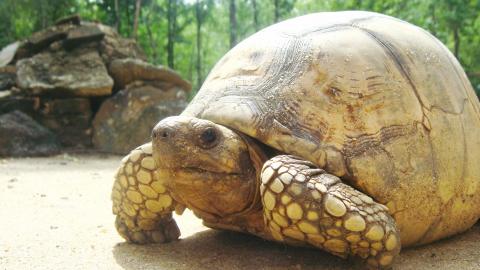The Taipei Zoo said it is working with global partners to prevent an endangered tortoise species from sharing the same fate as Lonesome George, the last of a subspecies of tortoise that died last week on June 24.
“Lonesome George is in the past now. The pressing issue is to prevent the tragedy from happening again to other tortoises threatened with extinction,” said Chang Ming-hsiung (張明雄), chief executive of the zoo’s Conservation and Research Center.
Lonesome George, a Pinta Island giant tortoise (Chelonoidis nigra abingdonii) that lived in the Galapagos Islands, died at the age of 100, prompting worldwide mourning over the beloved conservation icon.

Photo courtesy of Taipei Zoo
The subspecies is believed to have become extinct because Lonesome George, which had been kept in captivity in Galapagos National Park since the 1970s, failed to leave any offspring.
Although it caused consternation among conservationists, the tortoise’s demise may help other species survive.
It has prompted the Taipei Zoo to reflect on its conservation strategy for the endangered Burmese star tortoise. The zoo has 19 of the turtles, which were found in the 1990s in Taiwan after being illegally smuggled into the country for the pet or medicine markets.
That is 6.3 percent of the estimated global population of 300 for a species ranked 11th in the Turtle Conservation Coalition’s report last year entitled Turtles In Trouble: The World’s Top 25+ Endangered Tortoises and Freshwater Turtles.
Speaking at an international workshop the zoo held last week to discuss ways of restoring tortoise populations, Donal Boyer, curator of herpetology at the Bronx Zoo in New York, said the case of Lonesome George pointed to the need for conservationists to work more closely together to establish captive breeding programs.
Chang agreed, saying that a successful partnership would mean frequent exchanges of information on details such as the reptile’s habits and behavior as well as new high-tech breeding methods.
Chang cited as an example the time when the Taipei Zoo contacted the Behler Chelonian Conservation Center in California with the help of the Bronx Zoo in 2006 for advice on lifting the hatchling survival rate of its Burmese star tortoises.
As a result of the partnership, the survival rate improved from under 10 percent to 70 percent.
Another benefit of a strong network is the exchange of robust genetic diversity to increase the group’s chances for survival, said Gerald Kuchling, a conservationist at the University of West Australia.
Chang said these multinational efforts are aimed at creating “recovery houses” for the tortoises, natural sanctuaries that imitate the animal’s original habitat.
He said the Taipei Zoo’s next step would be to work with the Bronx Zoo-based Wildlife Conservation Society to prepare its Burmese star tortoises for reintroduction into such recovery houses in Myanmar next year.
However, the ultimate goal is to restore natural habitats so the creatures can be released into the wild.
“The Burmese star tortoises deserve to live in their original habitats in Myanmar,” Chang said. “They deserve to live in the wild instead of dying alone in zoos.”

Chinese spouse and influencer Guan Guan’s (關關) residency permit has been revoked for repeatedly posting pro-China videos that threaten national security, the National Immigration Agency confirmed today. Guan Guan has said many controversial statements in her videos posted to Douyin (抖音), including “the red flag will soon be painted all over Taiwan” and “Taiwan is an inseparable part of China,” and expressing hope for expedited reunification. The agency last year received multiple reports alleging that Guan Guan had advocated for armed reunification. After verifying the reports, the agency last month issued a notice requiring her to appear and explain her actions. Guan

GIVE AND TAKE: Blood demand continues to rise each year, while fewer young donors are available due to the nation’s falling birthrate, a doctor said Blood donors can redeem points earned from donations to obtain limited edition Formosan black bear travel mugs, the Kaohsiung Blood Center said yesterday, as it announced a goal of stocking 20,000 units of blood prior to the Lunar New Year. The last month of the lunar year is National Blood Donation Month, when local centers seek to stockpile blood for use during the Lunar New Year holiday. The blood demand in southern Taiwan — including Tainan and Kaohsiung, as well as Chiayi, Pingtung, Penghu and Taitung counties — is about 2,000 units per day, the center said. The donation campaign aims to boost

The Kaohsiung Tourism Bureau audited six hotels in an effort to prevent price gouging ahead of Korean band BTS’ concert tour in the city scheduled for Nov. 19, 21 and 22 this year. The bureau on Friday said that the audits — conducted in response to allegations of unfair pricing posted on social media — found no wrongdoing. These establishments included the local branches of Chateau de Chine, Hotel Nikko, My Humble House, and Grand Hai Lai, it said, adding that the Consumer Protection Commission would have penalized price gougers had the accusations been substantiated. The bureau said the Tourism Development Act

The Central Weather Administration (CWA) said a magnitude 4.9 earthquake that struck off the coast of eastern Taiwan yesterday was an independent event and part of a stress-adjustment process. The earthquake occurred at 4:47pm, with its epicenter at sea about 45.4km south of Yilan County Hall at a depth of 5.9km, the CWA said. The quake's intensity, which gauges the actual effects of a temblor, was highest in several townships in Yilan and neighboring Hualien County, where it measured 4 on Taiwan's seven-tier intensity scale, the CWA said. Lin Po-yu (林柏佑), a division chief at the CWA's Seismological Center, told a news conference